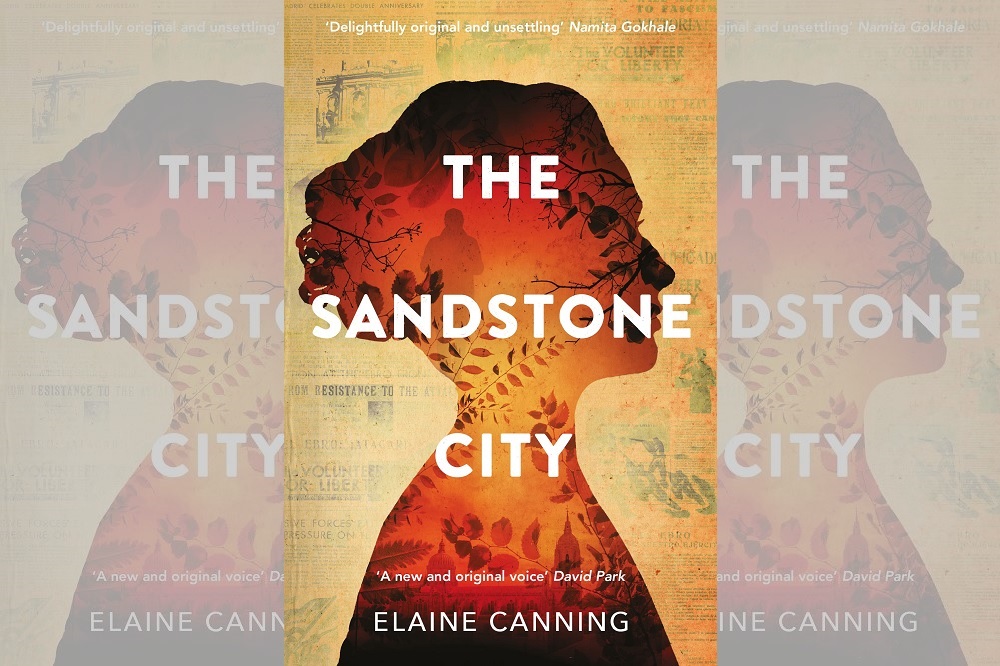Book of the Week: Sandstone City by Elaine Canning

Rajvi Glasbrook-Griffiths
Set in Belfast and Salamanca, ‘The Sandstone City’ is a novel that moves between place and time, past and present, as effectively as it does between the living and the dead. In doing so it plays with conventions of genre and melds magic realism, the ghost story, and the real, as we understand it. That way in which we make peace with the past only upon confronting it is the thread Elaine Canning weaves throughout this very accomplished and quietly moving debut novel.
It opens with eighty-eight year old Michael Doherty in the bay window of his living room, lying in his coffin, waiting for the lid to open, listening to his sprawling friends and family paying him their respects. ‘That’s my Mary alright, speaking ill of the dead before I was even pronounced.’
As one of six in a Belfast family, Canning more than understands the humour, resentments, and deep bonds that shape such a family. The phone calls, the love and care, well-meaning but not always well-placed, and the various dynamics all portray a Doherty family that is familiar and relatable.
Michael is dead but he is not gone, and what preoccupies him is his granddaughter, Sarah. So begins a story of faith in how those we love and love us may watch over us.
‘There are always those looking out for us, even when we feel at our loneliest,’ says Cormac, Michael’s son, also not of the living. However, it is resonant that for Canning, faith does not solely imply faith in a God.
There is faith in family and friendship, and there is immense faith in love.
‘The faith I took for granted was my Annie’s faith in me,’ rues Michael in memory of his wife, and indeed in other words, as the novel unfolds, of other faiths betrayed. To this effect, Canning makes it so that faith and love can be understood interchangeably.
Ghosts
It is a mystery to all in the family why Sarah, the granddaughter, has returned so suddenly from Spain after her plans to live there. Something terrible has happened, that is clear, but Sarah carries her trauma tightly coiled.
The sandstone city that is Salamanca has taken away her peace, and this is something her grandfather understands all too well. There can be no ‘crossing over’ for him until both his own and Sarah’s ghosts are laid to rest, and until both of them can find redemption. For that, they must return to Spain as well as to their pasts.
Canning does not flinch from the lesser discussed elements of Irish involvement in the Spanish Civil War. By embedding into the narrative of Michael and Tommy – a central figure who we come to know later in the story – the very real conflict between the support by the Catholic Church of the Catholic fascists in Spain and those wanting to defeat fascism, we are shown how history so often not only revises itself for the present day, but also at times averts its gaze.
Powerful
One of the standout aspects of ‘The Sandstone City’ is Michael’s diary, from his time in the Civil War. The language is vivid and powerful and the crossings-out, emphasis and voice all ring with much truth.
‘I’ll keep trying to be pretending to want to be the soldier I came here to be.’ Words written over sixty years by a young man whose entire life has since passed, a man ‘who belonged here and elsewhere’, a man who found a place for love in war.
Vitality
Occasionally, the dead within the living world make themselves heard a little too literally, as Canning gives agency to these other histories, other stories, and other experiences. This in equal part adds lightness of touch and expands the focus of the narrative.
Jose Luis, Charlie and Ana all resonate with vitality. It is possible that for some readers the prominence with which these characters intrude into the living could detract from the comparatively more developed purpose around Michael’s presence.
However, by the same measure they also serve to deepen our understanding of Michael’s past.
Redemption
Love shared cannot be erased, is like a refrain in the final chapter of the novel. Redemption is found, and there is indeed both a reconciliation as well as a release of the past in order to make way for the present.
That Sarah finds both love as well as a deeper part of her identity through the course of the novel, even if not in the way she sets out to, is an example of how history does indeed repeat but not as reconstruction, since it changes with us each time too.
In time, Canning seems to be saying, we have to release past versions of ourselves, we will heal, and a heart can only remain broken for so long.
Sandstone City by Elaine Canning is published by Aderyn Press. It is available from all good bookshops or you can buy a copy here.
Support our Nation today
For the price of a cup of coffee a month you can help us create an independent, not-for-profit, national news service for the people of Wales, by the people of Wales.





